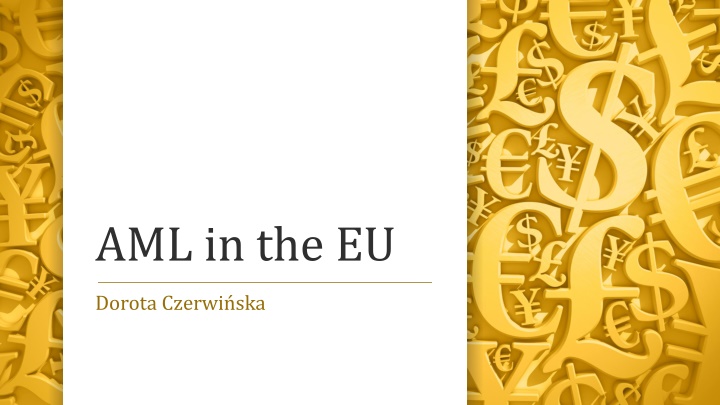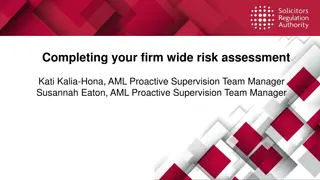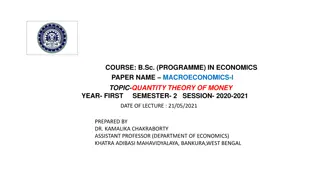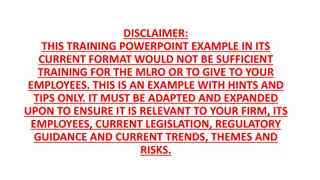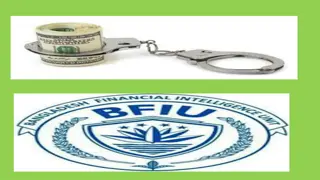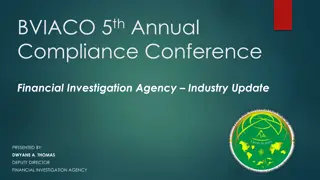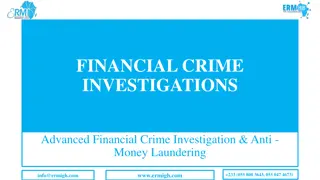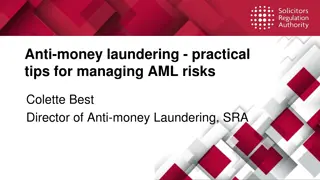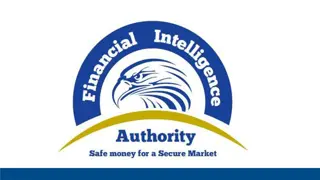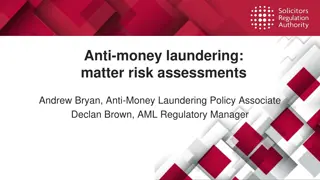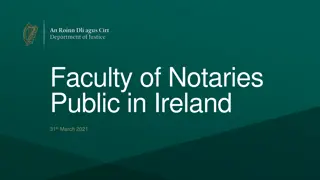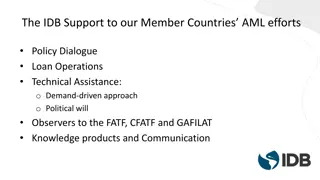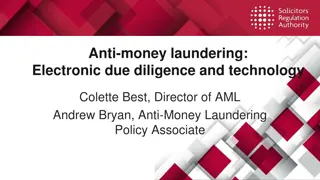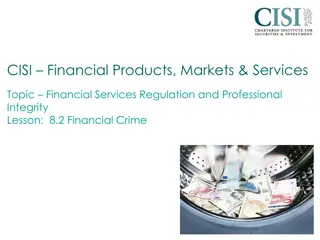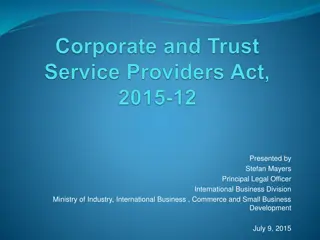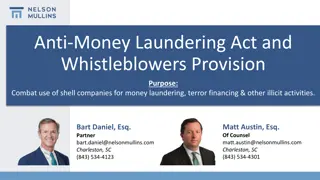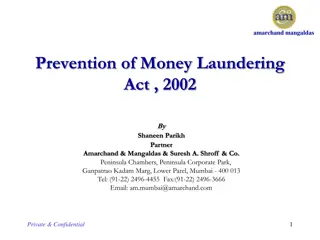Evolution of Anti-Money Laundering Regulations in the EU
Explore the history and milestones of Anti-Money Laundering (AML) regulations in the EU, from the initial directives in 1991 to the latest amendments. Learn about the obligations on private entities, enforcement of AML laws, and the focus on gatekeepers in the financial system. The directives have evolved to include a Risk-Based Approach, UBO transparency, and the recent inclusion of crypto exchangers. Understand the framework established by the 4th AML Directive of 2015, further shaped by subsequent amendments.
Download Presentation

Please find below an Image/Link to download the presentation.
The content on the website is provided AS IS for your information and personal use only. It may not be sold, licensed, or shared on other websites without obtaining consent from the author.If you encounter any issues during the download, it is possible that the publisher has removed the file from their server.
You are allowed to download the files provided on this website for personal or commercial use, subject to the condition that they are used lawfully. All files are the property of their respective owners.
The content on the website is provided AS IS for your information and personal use only. It may not be sold, licensed, or shared on other websites without obtaining consent from the author.
E N D
Presentation Transcript
AML in the EU Dorota Czerwi ska
AML in the EU history 1st AML Directive 1991 obligation to criminalise ML, AML obligations on private entities gatekeepers for the financial system especially reporting suspicious transactions 2nd AML Directive 2001 enlarging the catalogue of gatekeepers (NBFIs, DNFBPs including lawyers), obligation to establish Financial Intelligence Units 3rd AML Directive 2005 introduction of the Risk-Based Approach (RBA) customer due diligence ranges from simplified to enhanced, depending on the client s risk profile; penalties for AML breaches 4th AML Directive 2015 - enlarging the catalogue of gatekeepers (gambling based firms), inclusion of certain occassional non-business transactions over 40.000 euro in the system, introduction of the Ultimate Beneficial Owners (UBO) 5th AML Directive 2018 crypto exchangers and crypto wallet providers included in the system, reduction in prepaid card limits, strengthening the transparency agenda UBO must go public Last Amendment (sometimes called 6th AML Directive) 2018 back to the roots codification of 22 predicate offences, repressive liabiality of legal entities for the crimes committed by members of their boardetc. Legal frameworknow = 4th AML Directive 2015as amended by the 5th and further amendments
Money Laundering Article 1 (a) the conversion or transfer of property, knowing that such property is derived from criminal activity or from an act of participation in such activity, for the purpose of concealing or disguising the illicit origin of the property or of assisting any person who is involved in the commission of such an activity to evade the legal consequences of that person's action; (b) the concealment or disguise of the true nature, source, location, disposition, movement, rights with respect to, or ownership of, property, knowing that such property is derived from criminal activity or from an act of participation in such an activity; (c) the acquisition, possession or use of property, knowing, at the time of receipt, that such property was derived from criminal activity or from an act of participation in such an activity; (d) participation in, association to commit, attempts to commit and aiding, abetting, facilitating and counselling the commission of any of the actions referred to in points (a), (b) and (c). IF COMMITTED INTENTIONALLY. even where the activities which generated the property to be laundered were carried out in the territory of another Member State or of a third country
Terrorist Financing Article 1 The provision or collection of funds, by any means, directly or indirectly, with the intention that they be used or in the knowledge that they are to be used, in full or in part, in order to carry out any of the terrorist offences as described in the 2002/475/JHA, whether by terrorist organisations or by individuals acting alone or in small networks [a terrorist act = a combination of objective elements (such as murder, bodily injuries, hostage taking, extortion, committing attacks, or a threat to commit any of the above) and subjective elements (such as acts committed with the objective of seriously intimidating a population, destabilising or destroying the structures of a country or international organisation, or making a government abstain from performing actions], Council Framework Decision
Criminal activity terrorist acts set out in Articles 1 to 4 of Framework Decision 2002/475/JHA; any of the offences referred in Article 3(1)(a) of the 1988 United Nations Convention against Illicit Traffic in Narcotic Drugs and Psychotropic Substances; the activities of criminal organisations as defined in Article 1 of Council Joint Action 98/733/JHA (27); fraud affecting the Union's financial interests, where it is at least serious, as defined in Article 1(1) and Article 2(1) of the Convention on the protection of the European Communities' financial interests (28); corruption; all offences, including tax crimes relating to direct taxes and indirect taxes and as defined in the national law of the Member States, which are punishable by deprivation of liberty or a detention order for a maximum of more than one year or, as regards Member States that have a minimum threshold for offences in their legal system, all offences punishable by deprivation of liberty or a detention order for a minimum of more than six months
AML AML = Anti-Money Laundering = the system of preventing money- laundering by imposing obligations to provide information or actively on the states as well as private companies
Personal Scope of Application Article 2 credit and financial institutions trust or company service providers not already covered auditors, external accountants and tax advisors; estate agents notaries and other independent legal professionals, where they participate, whether by acting on behalf of and for their client in any financial or real estate transaction, or by assisting in the planning or carrying out of transactions for their client concerning the: buying and selling of real property or business entities managing of client money, securities or other assets opening or management of bank, savings or securities accounts organisation of contributions necessary for the creation, operation or management of companies creation, operation or management of trusts, companies, foundations, or similar structures other persons trading in goods to the extent that payments are made or received in cash in an amount of EUR 10 000 or more, whether the transaction is carried out in a single operation or in several operations which appear to be linked providers of gambling services
The EU Commision, the Member States as all the obliged entities are supposed take steps to identify and assess the risks of money laundering and terrorist financing, taking into account risk factors including those relating to their customers, geographic areas, services, transactions or delivery channels. Those steps shall be proportionate to the nature and size of the obliged entities. appropriate Conducting the risk assessment procedures has to be documented! countries or products,
Customer Due Diligence In case of new customers or serious transactions (more than 15.000 euro or even more than 1.000 euro if they are electronic transfers of funds, trade in goods of more than 10.000 euro, gambling for more than 2.000 euro) or when there is a suspicion of ML or TF or there are doubts as to the veracity or adequacy of the data provided by the client regardless whether it is a single operation or several operations which appear to be linked Excluded: electronic payment instruments of no more than 250 euro CDD includes: identifying the customer and verifying the customer's identity on the basis of documents, data or information obtained from a reliable and independent source; identifying the beneficial owner and taking reasonable measures to verify that person's identity, including, as regards legal persons, trusts, companies, foundations and similar legal arrangements, taking reasonable measures to understand the ownership and control structure of the customer; assessing and, as appropriate, obtaining information on the purpose and intended nature of the business relationship; conducting ongoing monitoring of the business relationship including scrutiny of transactions
All legal entities are obliged to obtain and hold adequate, accurate and current information on ownership their beneficial Beneficial ownership The information on the beneficial ownership shall be accessible to any person who proves a legitimate interest (there has to be a register) UBOwner = any natural person(s) who ultimately owns or controls the customer and/or the natural person(s) on whose behalf a transaction or activity is being conducted: Direct (by the natural person) or indirect (by another legal entity owned by the natural person) ownership of a sufficient percentage of shares (more than 25%)
All obliged entities have to: inform initiative, if they know, suspect or have reasonable grounds to suspect that funds, regardless of the amount involved, are the criminal activity or are related to terrorist financing, and by promptly respond to requests by the FIU for additional information in such cases; and the FIU on their own Reporting obligations proceeds of Every state has to have an idependent FIU responsible for AML which is In Poland it is the General Inspector of Information Financial providing indirectly, at its request, with all necessary information, in accordance with the procedures established by the applicable law the FIU, directly or Reporting to the FIU may not constitute a breach of any non- disclosure rules
All obliged entities have to: Provide internal training for their employees Other obligations Prepare procedures internal policies and Obliged entities also must refrain from conducting a suspicious transaction Document any procedures conducted At the same time they must not inform the suspected person of the fact they are informing the FIU
The future There is already a proposal of a new AML system on the table which contains: A new Directive which is supposed to take the place of the current 4th AML Directive 2015, which was only amended by the 5th and 6th The creation of a new EU authority to fight money laundering and coordinate national Financial Intelligence Units A new Regulation proposed which would cotain directly applicable rules, including in the areas of customer due diligence and beneficial ownership, as well as it will set up an EU-wide limit of 10,000 to cash payments
